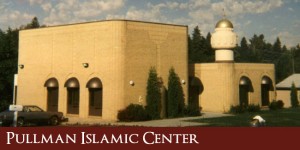Idaho Humanists Reach Out to Local Muslim Community After Online Threats

On November 22, our group, the Humanists of the Palouse (which serves members in Moscow, Idaho, and Pullman, Washington), became aware of some online threats directed towards a local mosque. Founded in 1982, the Pullman Islamic Center has been a part of the Palouse community for a very long time. Needless to say, reading these threats of arson by nonlocals was shocking, especially on the heels of an arson attack on the local Planned Parenthood. We took this very seriously, as did the local police department, who issued public statements that they would be increasing patrols around the area. It’s a much more personal matter to see terrorism at home, so we decided to take action and bring awareness to the fact that this isn’t just a one-off phenomenon and that there are many who unfortunately share these feelings.
After recent events in Paris, and the Charlie Hebdo attacks earlier this year, there have been more and more statements applying wholly anti-Muslim sentiments across the board. After a map was published by the Daily Caller listing supposed “radical mosques,” some readers took it upon themselves to voice violent statements like, “It should be burnt to the ground. Burn it. Just an opinion.” Being that there have been threats and actual acts of violence all the way from St. Petersburg, Florida, to Dearborn, Michigan, to now our town of Pullman, Washington, any threat made shouldn’t be taken lightly.
We decided to send the following message to the Pullman Islamic Center:
We fully support your right to practice religion free from harm and harassment…If you feel threatened, please do not hesitate to contact us. We would be happy to accompany anyone who feels that their safety is at risk (e.g. grocery shopping, on a walk around town, or just for someone to talk to). If we can advocate for you in any way, please don’t hesitate to reach out to us, and know that you have friends and allies amongst the Humanists of the Palouse.
Even though many members of our group are self-described atheists, agnostics, freethinkers, etc., we don’t condone lumping in peaceful adherents of Islam with those who practice its severely fundamentalist tenants, as ISIS does. To say that all Muslims are akin to this group is to lead to the kind of rhetoric that allows over half of the nation’s governors to publically declare that they won’t be accepting Muslim refugees, many of whom are Syrians seeking safety from their civil war. Simply because someone is a Muslim does not mean that they will be violent or even seek to promote violence. We may have theological differences, but we will absolutely defend their right to practice their faith as they see fit in a peaceful manner. A pluralistic society is a beautiful one, and we shouldn’t seek to demonize any group of people because they practice religion differently than does another group.
After writing our letter of support to the Pullman Islamic Center, many expressed their relief to hear that they had advocates from a local humanist group. Both the Pullman Islamic Association and the collegiate Washington State University (WSU) Muslim Student Association penned public responses to our letter of solidarity. The Pullman Islamic Center wrote in return:
We have noticed that the correct way to define and appreciate humanist groups in general and yours in particular is as lovers and defenders of civil rights, individual and group democratic dignities, and freedom of thought, not as haters of religion. Your group’s neighborly defense of freedom of religion in the Palouse demonstrates your focus on freedom and social justice. We are impressed by and thankful for your firm support and offer of assistance and solidarity.
The WSU Muslim Student Association expressed that they are “deeply appreciative for your kind support.” It was heartwarming to see that reaching out to a group by simply writing a letter of support would generate this kind of response in return. If many in this country truly seek to promote religious tolerance and freedom in this country, bridging our local community groups would be a great place to direct those efforts.
